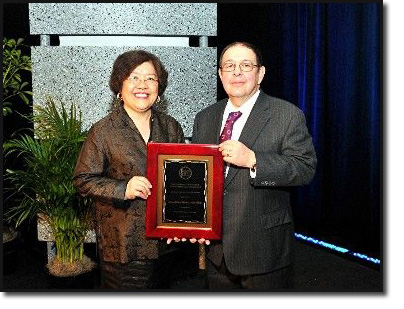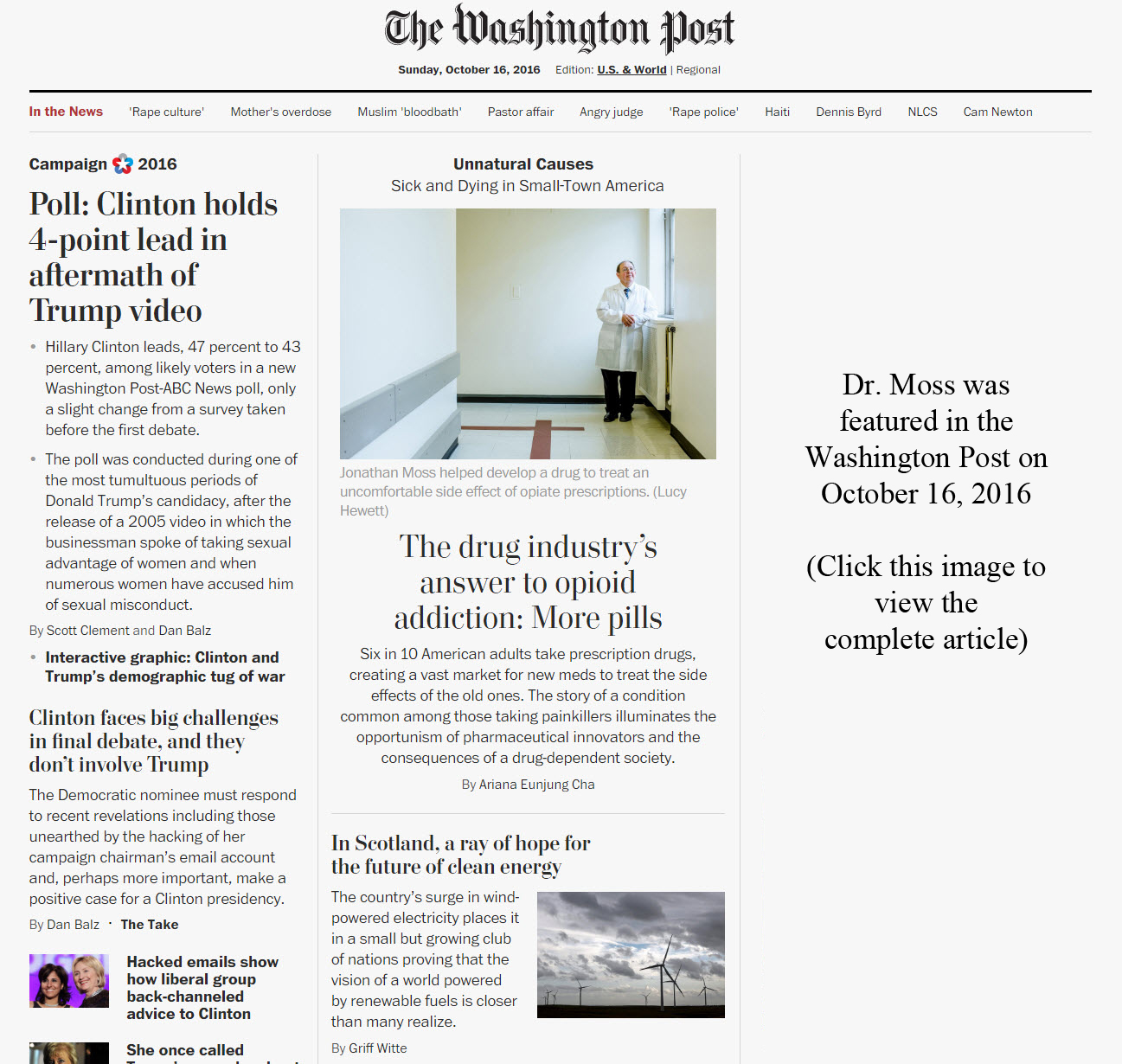Dr. Moss was chosen as Speaker
for the 2005 482nd Convocation ceremonies:
[ Video ] (Vimeo)
[ Text ] (Adobe Acrobat PDF
format)
Contact Information
Office: O-401
Office Phone: (773)
702-3091
e-mail:jm47@uchicago.edu
After
an undergraduate education at Harvard, Dr. Moss received his Ph.D.
(Professor Toshio Narahashi, Physiology and
Pharmacology) and his M.D. from Duke University. He subsequently trained at
the NIH under Nobel Laureate Julius Axelrod and Prof I. J. Kopin, and completed a residency in anesthesiology at
Massachusetts General Hospital (Harvard). In 1985, after 10 years on the
faculty at Harvard, Dr. Moss was appointed Professor at the University of
Chicago. Professor Moss has published more than 100 articles and 40
textbook chapters, predominantly in the area of the pharmacology of
anesthetic drugs. He has authored the chapters on "Autonomic
Pharmacology" and "Herbal Medications" in Miller's
Anesthesia, a well-known standard text in the field, and has given the
national refresher course lecture to the American Society of Anesthesiologists
(ASA) on adverse reactions to anesthetics five times and on peripheral
opiate antagonists five times. He has been a visiting professor at more
than 100 major universities worldwide in the past three decades, including
an appointment as Distinguished Visiting Professor in Anatomy and
Developmental Biology at the University College London, where he studied
smooth muscle pharmacology with Professor Geoffrey Burnstock.
Professor Moss was honored as the convocation speaker at the University of
Chicago in 2005. Dr. Moss has delivered the T.H. Seldon
Memorial Lecture at the 2008 IARS Annual Meeting, the State of the Art
Lecture at the American Society of Clinical Pharmacology and Therapeutics
(2010) (see image below), and the Leroy Vandam
Memorial Lecture (Harvard) in 2010. He has given refresher courses at the
World Federation of Societies of Anesthesiologists meetings in 2012 and
2016 on peripheral opiate antagonists.24 Professor Moss assumed emeritus status on June 30, 2017.

2010 ASCPT State of the Art Lecture Award being presented to
Prof. Moss by Dr. Shiew-Mei Huang president of
ASCPT and Deputy Director CDER-FDA
Professor Moss has served as consultant to several drug
companies that have introduced new anesthetics, including opiates and
muscle relaxants. A special area of his expertise involves adverse
reactions to anesthetic drugs and adjuvants in the perioperative period.1,2 He
has published extensively on the effects of anesthetic drugs and agents on
smooth muscle (vascular, ureteral and enteric) and on the effect of sex
hormones on the cerebral and coronary vessels. His areas of interest include
a study of the influence of dietary glycoalkaloids
on cholinesterase function,3 studies
of herbal medications in the perioperative period, 4-6 and
the development of methylnaltrexone (MNTX), a
quaternary peripheral opiate antagonist that relieves the peripheral side
effects of opiates while preserving analgesia.7-10 Traditional laxative
treatments are often ineffective for many chronic pain patients suffering
with opioid-induced constipation. Approximately 80% of chronic pain
patients with OIC taking laxatives reported
difficulties dealing with their constipation symptoms, as documented by a
large patient survey (Pain Medicine, 2008). One third
of these chronic pain patients stopped or lowered their opioid
dose in order to relieve their constipation, resulting in
increased pain levels.
MNTX (RELISTOR), given subcutaneously, has been approved for
the treatment of opioid induced constipation (OIC) in palliative care
patients in more than 50 countries, including the US, EU, Canada,
Australia, and several countries in Asia and South America. MNTX is
licensed by the University of Chicago to Progenics Pharmaceuticals and
currently sub-licensed to Salix Pharmaceuticals for worldwide sales and
development. Bausch Health was acquired by Valeant
Pharmaceuticals International, Inc. (see
announcement). RELISTOR was approved by the FDA and EMA for
the treatment of opioid-induced constipation in patients with non-cancer
pain.
An oral form of Relistor was
approved by the FDA on July 19, 2016 (see
announcement).


A recent focus of Professor Moss' research has been the use of
MNTX in the ICU and the relationship of the mu opioid receptor and cancer
progression (see UC Press Releases 1 and 2)
11-17,20,21,23 and the use of MNTX in intensive care to facilitate
nutrition, restore bowel function and reverse the effects of opiates on
bacterial sepsis. 18,19,22 The association between MNTX response and increased survival in advanced cancer patients has been recently presented and published 24 (see attachments 1 and 2). These are the first human data demonstrating that opioid antagonists at clinical doses are associated with increased survival in advanced cancer, and are consistent with our preclinical findings. A recent review article documents the development of methylnaltrexone (see attachment 1).
Selected Bibliography
- Renz C, Laroche D, Thurn J, Finn H, Lynch J,
Thisted R, Moss J: Tryptase levels are not increased during
vancomycin-induced anaphylactoid reactions.
Anesthesiology, 89:620-5, 1998
- Moss
J: Allergic to anesthetics. Anesthesiology 99:521-523, 2003
- McGehee DS, Krasowski MD, Fung
DL, Wilson B, Gronert GA, Moss
J: Cholinesterase inhibition by potato glycoalkaloids
slows mivacurium metabolism. Anesthesiology
93:510-519, 2000
- Ang-Lee, Michael, Moss J, Yuan, C-S:
Herbal medicines and perioperative care. JAMA 286: 208-216, 2001
- Yuan
C-S, Wei G, Dey L, Karrison
T, Nahlik L, Maleckar
S, Kasza K, Ang-Lee
M, Moss J: American ginseng reduces
warfarin's effect in healthy subjects: A randomized controlled trial.
Ann Int Med 141:23-27, 2004
- Moss,
Jonathan M.D., Ph.D.; Yuan, Chun-Su M.D., Ph.D.: Herbal Medicines and
Perioperative Care; Editorial Views- Anesthesiology. 105(3):441-442,
September 2006.
- Yuan
CS, Foss JF, O'Connor M, Osinski J, Karrison T, Moss J, Roizen
MF: Methylnaltrexone reverses chronic
opioid-induced constipation: a randomized, controlled trial. JAMA
283:367-72, 2000.
- Ho
W-Z, Guo C-J, Yuan C-S, Douglas SD, Moss J: Methylnaltrexone
antagonizes opioid-mediated enhancement of HIV infection of human
blood mononuclear phagocytes. Journal of Pharmacology and Experimental
Therapeutics 307:1158-1162, 2003.
- Yuan
CS, Doshan H, Charney
MR, O'Connor M, Karrison T, Maleckar SA, Israel R, Moss J: Tolerability, gut
effects, and pharmacokinetics of methylnaltrexone
following repeated intravenous administration in humans. J Clin Pharmacol
45:538-546, 2005
- Moss
J, Rosow CE: Development of peripheral
opioid antagonists: New insights into opioid effects. Mayo Clin Proc 83:1116-1130, 2008
- Singleton
PA, Lingen MW, Fekete
MJ, Garcia JGN, Moss J: Methylnaltrexone
inhibits opiate and VEGF-induced angiogenesis: Role of receptor
transactivation. Article- Microvascular Research, Volume 72, Issues
1-2, July-September 2006, Pages 3-11
- Singleton
PA, Moreno-Vinasco L, Sammani
S, Wanderline SL, Moss J, Garcia JGN:
Attenuation of vascular permeability by methylnaltrexone:
Role of mu opioid receptor, RhoA/ROCK and
SIP3 receptor transactivation. Am J Respir
Cell Mol Biol
37:222-231, 2007
- Singleton
PA, Garcia JGN, Moss J: Synergistic effect of methylnaltrexone
with 5-fluorouracil (5-FU) and bevacizumab on inhibition of
VEGF-induced angiogenesis. Mol Cancer Ther 7:1669-1679, 2008
- Singleton
PA, Mambetsariev N, Lennon FE, et al: Methylnaltrexone potentiates the anti-angiogenic
effects of MTOR inhibitors. J Angiogenesis Res 2:5, 2010
- Mathew
B, Lennon FE, Siegler JG, et al: Novel role
of the mu opioid receptor in lung cancer progression. Anesth Analg
112:558-567, 2011
- Lennon
FE, Moss J, Singleton P: The mu opioid
receptor in cancer progression: Is there a direct effect?
Anesthesiology 116:940-945, 2012
- Lennon
FE, Mirzapoiazova T, Mambetsariev
B, Salgia R, Moss J, Singleton
P: Overexpression of the mu opioid receptor in human non-small cell
lung cancer promotes Akt and mTOR activation, tumor growth, and metastasis.
Anesthesiology 116:857-867, 2012
- Babrowski T, Holbrook C, Moss J, Gottlieb L, Valuckaite
V, Zaborin A, Poroyko
V, Liu DC, Zaborina O, Alverdy JC: Pseudomonas aeruginosa virulence
expression is directly activated by morphine and is capable of causing
lethal gut derived sepsis in mice during chronic morphine
administration. Ann Surg 255:386-393, 2012
- Sawh SB, Selvaraj IP, Danga A, Cotton AL, Moss J, Patel
PB: Use of methylnaltrexone for the
treatment of opioid induced constipation in critical care patients.
Mayo Clin Proc 87:255-259, 2012
- Singleton
P, Mirzapoiazova T, Lennon FE, Moss J, Salgia R: The mu opioid receptor promotes opioid
and growth factor-induced proliferation, migration and epithelial
mesenchymal transition (EMT) in human lung cancer. PLoS
ONE 24:e91577, 2014
- Singleton
P, Mirzapoiazova T, Rifat
H, Salgia R, Moss J: Increased Mu Opioid
Receptor Expression in Metastatic Lung Cancer. Br J Anaesth 113: Suppl
1:i103-i-108, 2014
- Moss
J, Patel P: Nutrition in the acute phase of critical illness. N Engl J Med 19:2449, 2014
- Singleton PA, Moss, J, Karp DD, Atkins JT, Janku F: The mu opioid receptor: a new
target for cancer therapy? Cancer. 2015 Aug 15;121(16):2681-8.
doi: 10.1002/cncr.29460.
Epub 2015 Jun 4.
- Janku F, Johnson LK, Karp DD, Atkins JT, Singleton PA, Moss J: Treatment with methylnaltrexone
is associated with increased survival in patients with advanced
cancer. Ann Oncol. 2016 Nov;27(11):2032-2038. Epub 2016 Aug 29.
- Moss J: Identifying and Treating Opioid Side Effects The Development of Methylnaltrexone. Anesthesiology 130:142-148, 2019
Anesthesia &
Critical Care
|